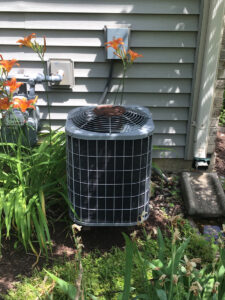 The one thing you should know about your air conditioner is that it takes a lot of different components working together for the system to function as efficiently and effectively as it’s meant to, and to perform at all. It’s a complex electronic appliance with many wires, switches, motors, and capacitors. When something goes amiss with this system, it’s always solvable—but you need to call on an experienced pro for the job.
The one thing you should know about your air conditioner is that it takes a lot of different components working together for the system to function as efficiently and effectively as it’s meant to, and to perform at all. It’s a complex electronic appliance with many wires, switches, motors, and capacitors. When something goes amiss with this system, it’s always solvable—but you need to call on an experienced pro for the job.
If your air conditioner isn’t working, even if you’re sure you know why, it’s time to give us a call. In the meantime, read on to learn about how your AC problems could be connected to one AC component in particular—a capacitor.
What Is a Capacitor?
The capacitor is an electrical component that functions as a temporary battery for the system’s motors. They store voltage, and then send that voltage to the motors. Most motors have two capacitors built in, one that starts the motor and the other that keeps it running. Capacitors do not last as long as the entire air conditioner, which can remain functional for 10-15 years if it’s well taken care of. So eventually you will need to have one replaced.
How Do You Know if You Have a Bad Capacitor?
First of all, you should be scheduling maintenance once a year for your air conditioner—twice a year if it’s a heat pump. During this service, our technicians will thoroughly inspect your entire system, checking for things like bad capacitors, or at least worn down capacitors that could break down soon.
But the signs of a bad capacitor are similar to signs of other AC problems—this includes warm air coming from the vents, a system that’s making odd noises, or even a system that’s short-cycling. Clogged filters, refrigerant leaks, and ill-maintained or improper installation can all lead to these problems—which is why it’s so important that you call on an experienced pro if you suspect something is amiss.
That said, there are some particular signs you can watch out for that are usually specific to a bad capacitor, such as:
- The system takes too long to start when you turn it on.
- You hear a humming noise coming from the system.
- The AC shuts off on its own or won’t turn on at all.
- You hear a clicking noise from the cabinet.
If any of this seems familiar, then you could be looking at a bad capacitor.
“Can’t I Just Replace a Capacitor Myself?”
We really recommend against this. The smallest mistake can lead to a powerful electric shock.
Our professionals will be able to assess your capacitors, choose a new component that is correctly sized, and one that matches the correct voltage rating and microfarads for your system.
This is true for most AC repairs—it’s always best to trust an experienced professional. There are a couple of things you can do on your own. For instance, you should change out your air filter every 1-3 months to prevent airflow issues, and clear out the area around your outdoor unit for the same reason.
For professional air conditioning service in Nashville, TN, contact Covenant Heating and Cooling.
